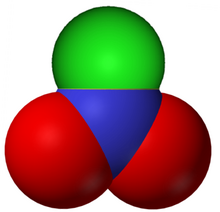Nitryl chloride is a volatile inorganic compound with formula ClNO2. At standard conditions it is a gas.

| |
 Ball model of nitryl chloride
| |
| Identifiers | |
|---|---|
3D model (JSmol)
|
|
| ChEBI | |
| ChemSpider | |
PubChem CID
|
|
| UNII | |
CompTox Dashboard (EPA)
|
|
| |
| |
| Properties | |
| ClNO2 | |
| Molar mass | 81.46 g·mol−1 |
| Melting point | −145 °C (−229 °F; 128 K) |
| Boiling point | −15 °C (5 °F; 258 K) |
| Related compounds | |
Other anions
|
nitryl fluoride, nitryl bromide |
Other cations
|
nitrosyl chloride, sulfuryl chloride |
Related compounds
|
chloro nitrite, chlorine nitrate |
Except where otherwise noted, data are given for materials in their standard state (at 25 °C [77 °F], 100 kPa).
| |
Formation
editNitryl chloride can be formed in the reaction of dinitrogen pentoxide with chlorides or hydrogen chloride:[1][2]
- N2O5 + 2HCl → 2ClNO2 + H2O
- N2O5 + NaCl → ClNO2 + NaNO3
Reactions
editNitryl chloride adds to olefins in a radical reaction.[3]
References
edit- ^ Gerber, R. Benny; Finlayson-Pitts, Barbara J.; Hammerich, Audrey Dell (2015-07-15). "Mechanism for formation of atmospheric Cl atom precursors in the reaction of dinitrogen oxides with HCl/Cl− on aqueous films" (PDF). Physical Chemistry Chemical Physics. 17 (29): 19360–19370. Bibcode:2015PCCP...1719360H. doi:10.1039/C5CP02664D. ISSN 1463-9084. PMID 26140681. S2CID 39157816.
- ^ Kelleher, Patrick J.; Menges, Fabian S.; DePalma, Joseph W.; Denton, Joanna K.; Johnson, Mark A.; Weddle, Gary H.; Hirshberg, Barak; Gerber, R. Benny (2017-09-18). "Trapping and Structural Characterization of the XNO2·NO3– (X = Cl, Br, I) Exit Channel Complexes in the Water-Mediated X– + N2O5 Reactions with Cryogenic Vibrational Spectroscopy". The Journal of Physical Chemistry Letters. 8 (19): 4710–4715. doi:10.1021/acs.jpclett.7b02120. ISSN 1948-7185. PMID 28898581.
- ^ Stacey, F. W.; Harris, J. F., Jr. (2004-04-30). "Formation of carbon-hetero atom bonds by free-radical chain additions to carbon-carbon multiple bonds". In Denmark, Scott E. (ed.). Organic Reactions (1 ed.). Wiley. doi:10.1002/0471264180.or013.04. ISBN 978-0-471-26418-7.